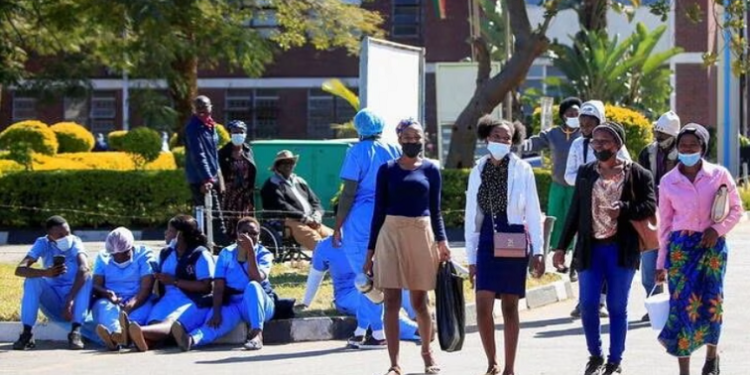Zimbabwean President Emmerson Mnangagwa has signed a bill into law that outlaws organised protests by healthcare workers in the country.
The newly gazetted Health Service Amendment Act now criminalises industrial action by healthcare workers lasting more than three days and offenders could now face a fine or imprisonment of up to six months.
This latest move by the government is likely to lead to a standoff between the Government and workers’ Unions in the health sector. This is a year where Zimbabwe is going to the polls.
Thousands of nurses and doctors at state-run hospitals in Zimbabwe went on strike in 2022 demanding better working conditions and improved remunerations.
Now the Zimbabwean government seeks to clamp down on such work stoppages by classifying the industry, including doctors and nurses, as an essential service.
Permanent Secretary at the Ministry of Information, Nick Mangwana says, “…Meaning that the health service now is subject to restrictions when it comes to labour action – such as strikes or withdrawal of labour. It’s an essential service, people can’t just go on strike at the expense of the vulnerable who would be dying in hospital.”
One of the key things put in place is that when they go on strike which they are entitled to still they should make sure that there is a service that covers emergencies.
The health workers claim they were not consulted and intend to fight this new law.
Zimbabwe Hospital Doctors Association, Danford Masona says, “It clamps down on the fundamental right which I believe is for every worker to go on industrial action. They say that we are essential services and there is a debate about that is it ethical for who suffers most, it’s the patient of course, but as much as it is every patient’s right to or every Zimbabwean’s right to get patient care, it’s also our right to get remuneration agreed upon. This bill what it does is it creates more tension.”
Most government-run hospitals are currently understaffed following an exodus of doctors and nurses leaving the country. In the last two years over 4 000 health workers are reported to have left the country according to Zimbabwe’s health watchdog.
Fears are that the new law will exacerbate the situation.
“What I see, in my own opinion, is most people are going to go into private practice because people are scared, and most people are going to move out of the country because of that law. It also brings down morale which is not there already at the moment. It’s clamping down on us and the small morale we had most people are not going to take it,” Masona explains.
According to the new law, anyone inciting or organising collective job action in defiance of the new conditions can be tried for a criminal offence and if found guilty fined or jailed for six months.
However, the government has defended the new law and maintains it is not meant to clamp down on dissent.
Mangwana adds, “What the government has done is just to harmonise our law with international practice. In the UK, a territory I am familiar with, the doctors cannot go on strike all of them. It doesn’t happen and they don’t go on strike for a time immemorial. If there is a crisis doctors on strike would just come back and attend to the crisis. It’s like you have a fire and you are told the fireman is on strike, does that even make sense or soldiers are on strike or the police on strike and people are stealing all over they are smashing houses and grabbing everything? You can’t do that. If you are an essential service there is a basic level in a society that is expected.”
Health Services Board has been dissolved and a new Health services commission will be established. Some now foresee a protracted standoff between the government and the healthcare workers. This is a year Zimbabwe will be going for crucial polls.






